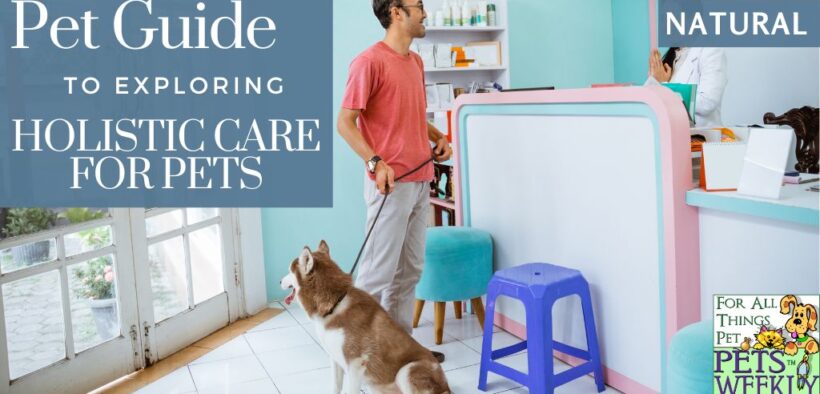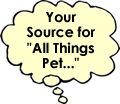Exploring Holistic Pet Care
Share

In today’s world, where wellness reigns supreme, pet care is no exception. We’re moving beyond mere treatment of symptoms and embracing a holistic approach to care for pets that prioritizes the overall well-being of our pets.
But what exactly is holistic pet care, and is it the right fit for your pets? Let’s delve into the world of holistic wellness, exploring its benefits, limitations, and when it’s time to consult a holistic veterinarian.
What is Holistic Pet Care?
Holistic pet care goes beyond conventional medicine, treating the whole animal rather than just the symptom. It considers the physical, emotional, and environmental factors that contribute to their overall health. This can encompass a range of practices, including:
Nutrition
Tailored diets rich in natural ingredients to support specific health needs and optimal digestion. This sometimes requires you to feed different diets to individual pets, which can be challenging in a multi-pet household. It can be done, though!
Acupuncture and Acupressure
Stimulating specific points to promote healing, pain relief, and improve circulation. Both acupuncture and acupressure are pillars of holistic pet care, aiming to restore balance and promote healing by stimulating specific points on the body. While sharing core principles from Traditional Chinese Medicine (TCM), they differ in technique and application.
Acupuncture uses thin, sterile needles inserted into designated acupoints, and is commonly used for pain management, digestive conditions, and immune system concerns.
Acupressure uses firm, but gentle pressure applied to acupoints using fingers, thumbs and sometimes specialized tools. This is commonly used for less serious conditions like nausea, improving circulation, and digestive disorders.
Herbal Remedies
Plants have a long history of healing (and hurting) in medicine. It’s important to work with professionals before creating or offering herbal remedies to pets. Utilizing plants with medicinal properties to address various concerns like allergies or anxiety can be highly effective, but must be done properly. Always work with a professional before using teas, salts, essential oils or other remedies on pets (especially cats).
Every type of chemical (organic and inorganic) has an LD (toxicity level) The lowest lethal dose (LDLo) is the least amount of drug that can produce death in a given animal species under controlled conditions.

Massage therapy
Massage therapy uses gentle manipulation to improve muscle tone, reduce stress, and enhance circulation. This is a highly effective method of relaxing pets, and offers great health benefits. But, it can also cause harm if you don’t use it properly. Work with a holistic vet professional and your veterinarian to ensure the best outcome.

Homeopathy
Homeopathy is the use of diluted substances to stimulate the body’s natural healing mechanisms. It’s similar to herbal remedies, but far more concentrated.
Behavioral therapy
We all know on a human level that we can have health problems related to emotional and mental problems. This line of treatment helps address the emotional issues between pets and their owners. It also focuses on improving communication.
A Spectrum of Benefits: Why Choose Holistic Care?
Holistic care offers a unique perspective on pet health, boasting several potential benefits:
Holistic pet care is especially beneficial to pets who are struggling with imbalances, whether it’s an allergy or food sensitivity or something related to a chronic condition. By addressing the care as a whole, we can treat more than just symptoms.
- Prevention: Addressing underlying imbalances before they manifest as illness.
- Reduced reliance on medication: Managing chronic conditions naturally, minimizing side effects.
- Improved quality of life: Enhancing energy levels, mobility, and overall well-being.
- Holistic approach: Addressing emotional and environmental factors for a complete picture.
- Stronger bond: Deeper understanding and connection with your pet through alternative practices.
Understanding the Limitations
While promising, holistic care isn’t a magic bullet. It’s very important to be aware of its limitations:
- Not a replacement: Holistic medicine shouldn’t replace traditional veterinary care for emergencies or serious illnesses. They can, however, usually be used in addition to modern medicine. Always speak to your veterinarian before adding supplements or alternatives of any kind. Holistic medicine is powerful and it can actively interfere with your pet’s current treatment plan.
- Limited research: Some practices lack extensive scientific evidence, requiring cautious exploration. Be very cautious when researching alternative medicine. It’s a very interesting topic for many people, but not every website is qualified to discuss or recommend options (including this one!). Always work with a certified holistic practitioner.
- Finding qualified practitioners: Choosing experienced and licensed professionals is essential. There are ways to do this, and they do not involve Dr. Google.
- Cost and time commitment: Some therapies require regular sessions and may be financially demanding.
When to Seek Out a Holistic Veterinarian
Consulting a holistic veterinarian is ideal for:
- Chronic conditions: Exploring alternative approaches for managing arthritis, allergies, or digestive issues.
- Senior pets: Supporting their overall well-being and optimizing their golden years.
- Behavioral concerns: Addressing anxiety, aggression, or other emotional challenges.
- Preventive care: Proactively promoting your pet’s health and vitality.
Making an Informed Choice: Partnering with Your Veterinarian
Ultimately, the decision to explore holistic care is personal. Open communication with your regular veterinarian is key. They can guide you, identify potential interactions with existing medications, and help you navigate the diverse options available.
Additional Resources:
- American Holistic Veterinary Medical Association: Use this map to find an AVMA-certified holistic veterinarian
- National Center for Complementary and Integrative Health: https://www.nccih.nih.gov/
Remember, holistic care is a journey, not a destination. It’s about understanding your pet’s unique needs and creating a personalized wellness plan that complements traditional veterinary care. By embracing a holistic approach, you can empower your furry friend to live a longer, happier, and healthier life.
This article is for informational purposes only and should not be construed as medical advice. Always consult with a qualified veterinarian before making any changes to your pet's healthcare routine.










